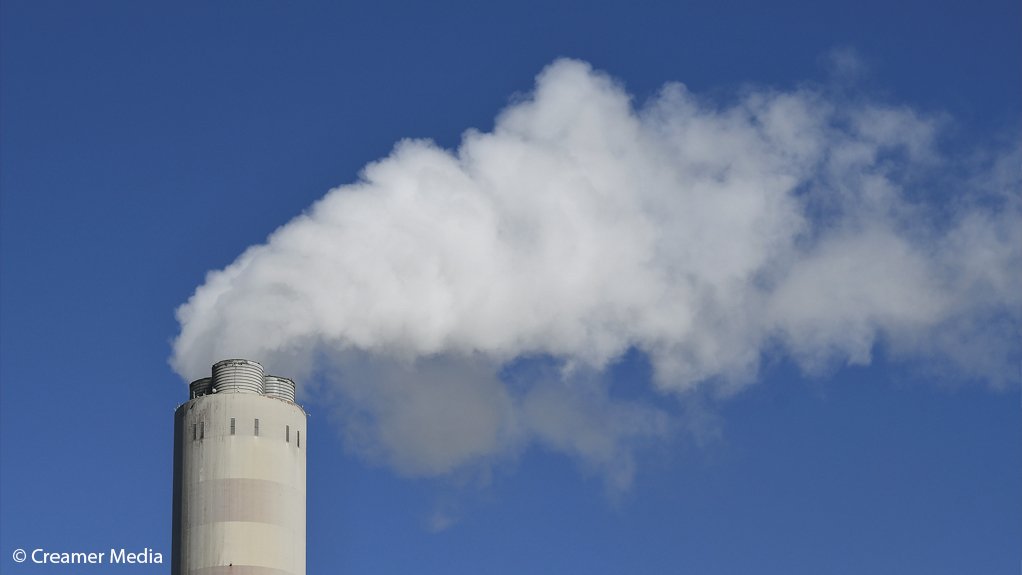Developing country carbon emissions clemency not applicable to South Africa – Nicholls


South Africa is a significant carbon-intensive emitter, sharing an emissions contributing position among the highest, globally
Photo by Creamer Media's Donna Slater
South Africa cannot be allowed to breach its climate change mitigation measures and Paris Agreement declarations despite it being an emerging country that is still heavily reliant on fossil fuels, South African Presidential Climate Commission mitigation head Steve Nicholls told delegates at last week’s ESG Africa Conference.
Many African countries have, of late, requested lenience in meeting climate change mitigation commitments, requesting also a delay in their abandonment of cheap and easy-to-obtain fossil fuels as a result of their delayed and inhibited industrial and social development.
Many argue that developed nations built their economy, industrial base and power generation network using vast volumes of fossil fuels and that Africa should also be allowed to burn the carbon intensive fuels for a while longer, while it develops.
However, Nicholls said South Africa, in particular, is a carbon-intensive emitter, sharing an emissions contributing position among the highest, globally.
For this reason, Nicholls said South Africa has to reduce its emissions immediately.
“There is no chance for us to increase our emissions.”
He posed the question of whether there should be an interim period during which very poor countries should be allowed to increase their emissions so that they can develop socially and in terms of their industries.
“The answer is probably yes, but in very small areas. It is not in power [generation]. It does not mean that we can go and build massive coal-fired power stations,” said Nicholls.
He added that gas was also not an avenue that should be exploited, despite its frequent marketing as a less carbon-intensive source of energy. “It does not mean we can do more oil and gas exploration,” Nicholls added.
He posited that there “may be some opportunity” for African nations to increase their emissions in certain industrial activities, but that fossil fuel-intensive forms of power generation were not an option and that South Africa could not afford to expand its burning of fossil fuels by any measure.
Globally, measures to limit temperature rise to 1.5 oC above preindustrial era levels, have to be implemented by every country, regardless of their stage of development. “. . . If we are to stay below 1.5 oC, we have to be net zero by 2050. And by we [I mean] everybody – the whole planet. Africa has to be as well. Australia has to be, everybody has to be [compliant in mitigation measures],” Nicholls stated.
In terms of what is required to limit and reduce emissions, he said the pace of change had to be “enormous . . . It is faster than you think, always.”
Nonetheless, Nicholls alluded that many African nations, South Africa included, would not achieve sufficient emissions reductions by 2050 and that significant regional warming was on the horizon.
He said that, realistically speaking, the 1.5 oC target would not be met. He added that it may be possible to limit the increase to 2 oC by 2050; however, analysis had shown that by implementing current policy measures, the increase in temperatures would be closer to 2.7 oC.
Taking this into account, Nicholls said South Africa was due to expect temperature increases of between 4 oC and 6 oC by 2050. This would result in severe social ailments, such as a 25% reduction in agricultural output and about 20-million climate migrants fleeing severe heat in regions that are already “borderline inhospitable”.
Article Enquiry
Email Article
Save Article
Feedback
To advertise email advertising@creamermedia.co.za or click here
Press Office
Announcements
What's On
Subscribe to improve your user experience...
Option 1 (equivalent of R125 a month):
Receive a weekly copy of Creamer Media's Engineering News & Mining Weekly magazine
(print copy for those in South Africa and e-magazine for those outside of South Africa)
Receive daily email newsletters
Access to full search results
Access archive of magazine back copies
Access to Projects in Progress
Access to ONE Research Report of your choice in PDF format
Option 2 (equivalent of R375 a month):
All benefits from Option 1
PLUS
Access to Creamer Media's Research Channel Africa for ALL Research Reports, in PDF format, on various industrial and mining sectors
including Electricity; Water; Energy Transition; Hydrogen; Roads, Rail and Ports; Coal; Gold; Platinum; Battery Metals; etc.
Already a subscriber?
Forgotten your password?
Receive weekly copy of Creamer Media's Engineering News & Mining Weekly magazine (print copy for those in South Africa and e-magazine for those outside of South Africa)
➕
Recieve daily email newsletters
➕
Access to full search results
➕
Access archive of magazine back copies
➕
Access to Projects in Progress
➕
Access to ONE Research Report of your choice in PDF format
RESEARCH CHANNEL AFRICA
R4500 (equivalent of R375 a month)
SUBSCRIBEAll benefits from Option 1
➕
Access to Creamer Media's Research Channel Africa for ALL Research Reports on various industrial and mining sectors, in PDF format, including on:
Electricity
➕
Water
➕
Energy Transition
➕
Hydrogen
➕
Roads, Rail and Ports
➕
Coal
➕
Gold
➕
Platinum
➕
Battery Metals
➕
etc.
Receive all benefits from Option 1 or Option 2 delivered to numerous people at your company
➕
Multiple User names and Passwords for simultaneous log-ins
➕
Intranet integration access to all in your organisation

















